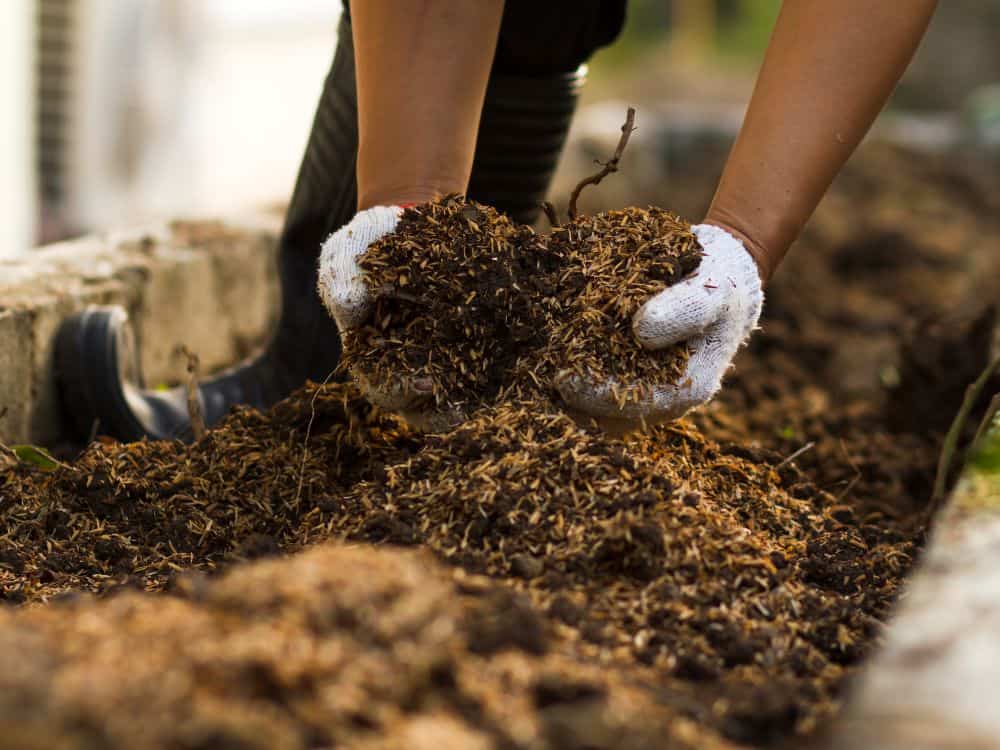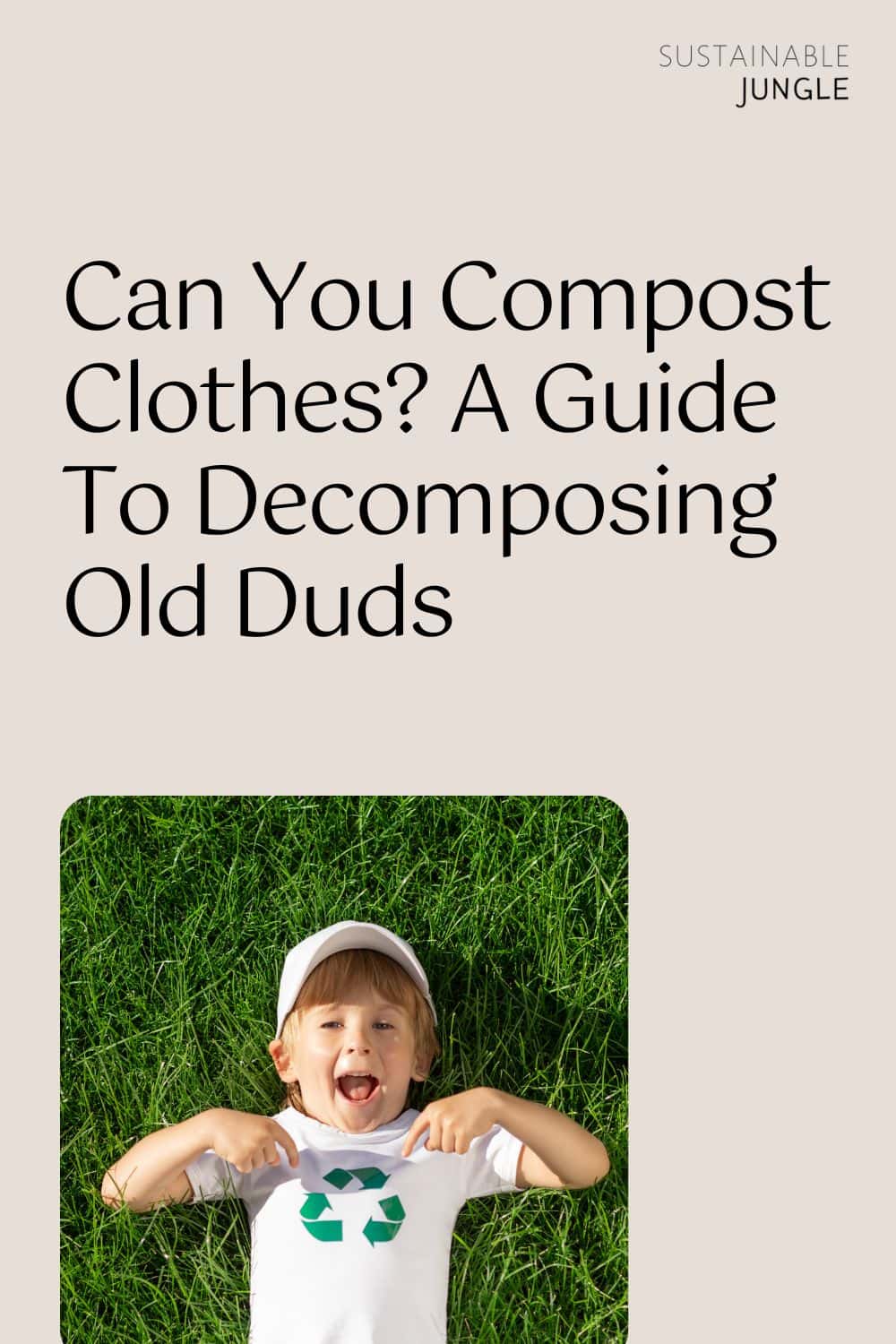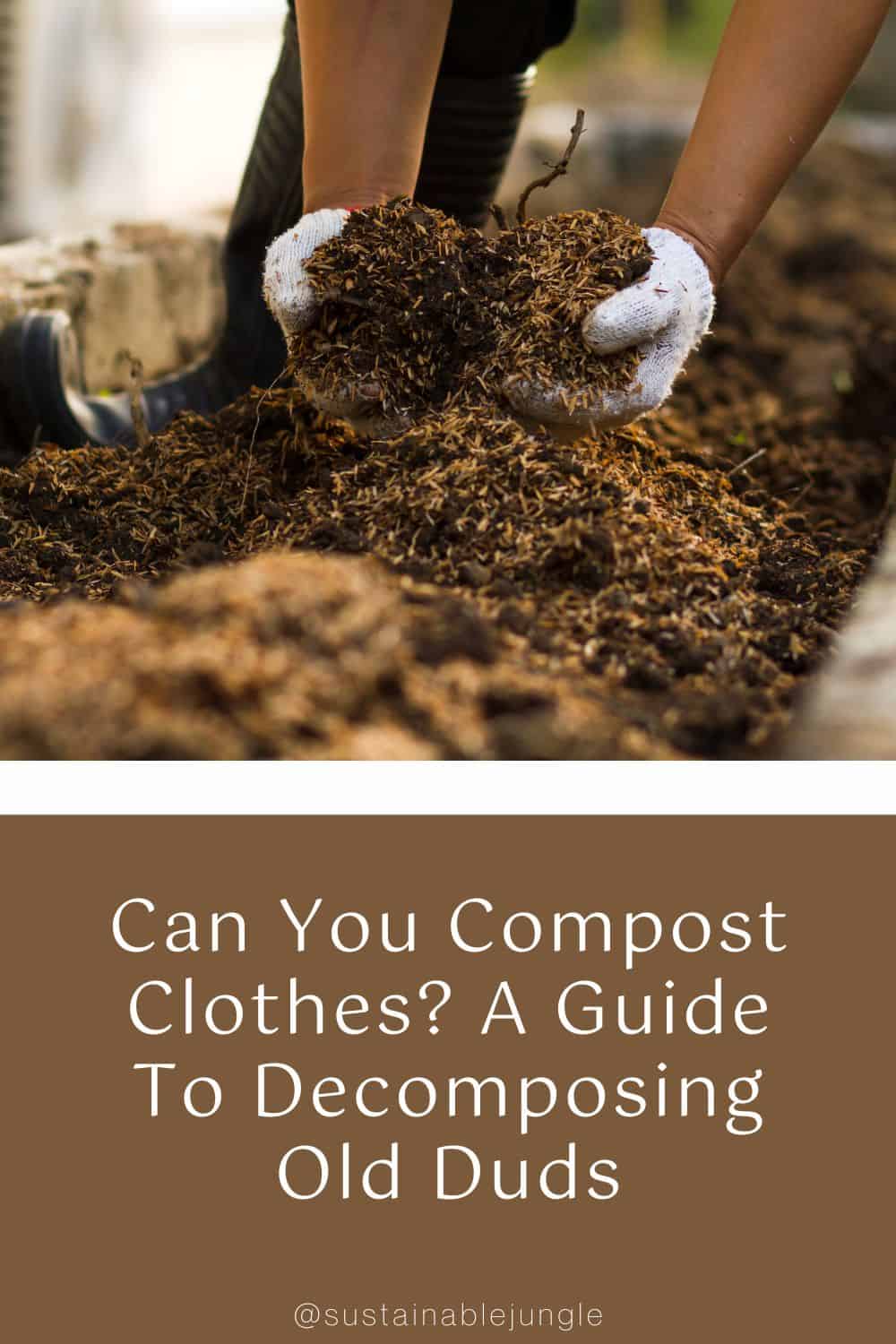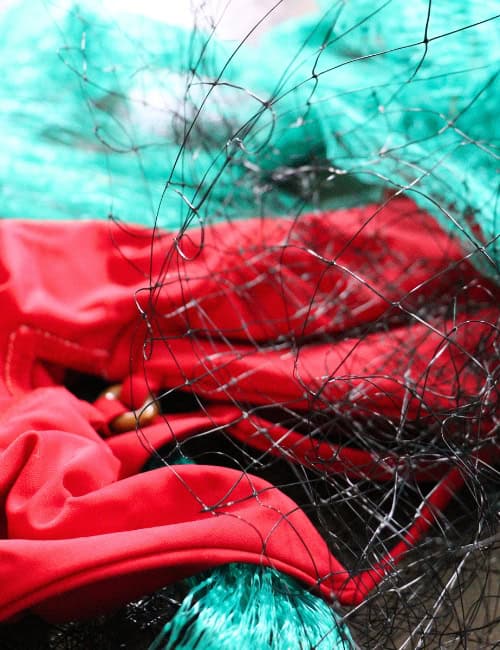
Can You Compost Clothes? A Guide To Decomposing Old Duds
It’s getting “hot in herre”—so compost all your clothes!
Okay, so that’s not exactly what Nelly sang, but it’s time we “move that body” toward better textile disposal solutions before the planet is “gone”.
The future of sustainable fashion—and our planet, considering the fast fashion industry is responsible for 8–10% of global emissions—depends on both new and age-old approaches to being custodians of nature.
Learning to compost clothes in particular is more needed than ever.
Textile waste today is off the racks, with the world consuming 80 billion pieces of clothing each year (up 400% from twenty years ago).
From that, as a collective we produce 92 million tons of textile waste annually, which end up in incinerators or landfills where they emit huge amounts of methane (25x more potent than CO2).
Yet more than 50% of total waste that lands in landfills could be used for composting!
If everyone in the US composted their food waste alone, it would be the equivalent of removing 7.8 million cars off the road.
Imagine what that number would be if we had a global fashion industry that included circularity and better conditions (or standards like Australia is developing) to compost old clothes.
Composting clothes is cost effective and uncomplicated, and it requires only a repository and the waste you’re already producing.
So, what are you sleeping on? A mountain of old pure cotton t-shirts and organic compostable clothing ready to become mulch?
Let’s roll up our biodegradable clothing sleeves and dig into the question: can clothes be composted?
The Full List For How To Compost Old Clothes
- What is compostable clothing?
- How do you know if you can put old clothes in compost?
- Types of compostable clothes
- How to compost clothing
- What about non-compostable clothes?
1. What Is Compostable Clothing?

Before we get into the dirty details, let’s answer the big question: can clothes be compostable?
Yes, clothing made of natural fabrics or organic fibers are typically compostable—and in fact can be an easy way to add brown material to the food waste greens indoor compost bin.
If you’re not au fait with the benefits of composting—or need a refresher—composting, by definition, is the process of breaking down and repurposing organic waste.
It’s nature’s own method of recycling natural waste back into nutritious soil to fuel her cycles.
Worms, snails, insects, bacteria, fungi, and microorganisms biodegrade (break down) organic matter (including compostable clothes) and turn it into an earthy substance called humus that gets fed back into the Earth. The best food waste solution and it’s a 100% au naturale.
For a compost pile to fruitfully produce humus, it needs three things:
- Browns: Dead plant matter (i.e. leaves) and wood based waste (i.e. twigs, paper, cardboard). This is also the category that clothing falls into. They’re all carbon rich materials.
- Greens: Live plant material (think food scraps, grass trimmings, fruit cores, coffee grounds, egg shells, and other kitchen scraps). They’re all nitrogen rich substances.
- Water: While most compost creates its own moisture as it does its job, sometimes a little water is needed, particularly in hot climates.
Once covered and left alone, the compost naturally becomes a very hot and moist environment in which it begins its decomposition, eventually becoming nutritious soil for your ecological garden.
That said, only certain garments can be composted, due to what they’re made of and how they’re made.
For example, clothing made of synthetic fabrics cannot be composted. This means anything made of polyester, nylon spandex (Lycra), or acrylics, which are manufactured from petrochemicals and take hundreds (perhaps thousands!) of years to biodegrade, therefore cannot be composted.
Additionally, they’re toxic to the environment as they break down.
2. How Do You Know If You Can Put Old Clothes In Compost?

So how do you make compostable clothes?
Finding clothes that are appropriate for the compost can be tricky; that said, composting clothes is totally possible. It’s also a viable solution to the enormous amount of clothing waste our planet faces.
Only clothing that is made from 100% natural fibers can be composted. You’ll have to read the tag on your garment to learn what it is made of.
Confused already?
We got you! Start by learning how to read clothing labels then look for the following sustainable fabrics that can be composted:
- Natural cotton (ideally organic cotton)
- silk
- wool
- linen
- cashmere
- hemp
- jute
- lyocell
- modal
- bamboo fabric
Fabric blends of natural and synthetic fibers are more of a judgment call, depending on the mix and how much synthetic fiber is in the blend. Some reports say a maximum of 1% synthetic fabric is appropriate for composting, while others say it can be 5% or even up to 9%.
If you’re including something with a bit more synthetic material in the blend, keep in mind that this compost might not be suitable for a vegetable garden.
Material isn’t the only thing you need to keep in mind if you’re looking to compost clothing.
Embellishments
Any embellishments like buttons, zippers, snaps, or other metal components won’t be biodegradable (unless they’re specified as made of organic material, like Corozo nut buttons) and will have to be removed.
Don’t forget about the thread!
Oftentimes, brands will use polyester thread (because it’s cheaper and stronger) in that 100% cotton t-shirt. For that reason, you’ll often see garment labels stating things like 100% cotton “exclusive of trims”.
That still doesn’t tell us much, so the safest bet is to rip out threads or cut away thread-intensive sections if you’re short on time.
Synthetic or Natural Dyes
Dyes are another common concern for composting clothing, given that many dyes used today are synthetic, toxic, and potentially carcinogenic.
Can you compost cotton dyed with these?
Technically yes. Synthetic dyes won’t stop your organic cotton fabric from decomposing, but the chemicals will likely leak out and could contaminate your soil.
And what’s tricky here is that we don’t really know if natural fibers were colored using natural dyes. While a label tells us the fabric, the dye ingredients are rarely listed. For that reason, there’s no way to confirm if clothing has a highly toxic dye involved.
This is why it’s best to compost clothing that is undyed or from eco-friendly clothing brands that specify if they use plant-based dyes, Azo-free non-toxic dyes, or other kinds of sustainable dyes.
Finishes
Fabric finishes are another consideration when it comes to looking to compost clothes.
Fashion brands will coat finished items in chemical finishes to improve the look or performance of the garment. These do things like make the textile stain-, crease-, or water-resistant, anti-microbial, or anti-static.
Sometimes they even include fluorocarbons (PFAS), which are very toxic “forever chemicals.”
As with synthetic dyes, these chemical finishes can have a negative impact on your backyard compost, making it unfit for gardening.
They also sometimes delay the material’s ability to biodegrade.
As with clothing dyes, fabric finishes aren’t typically mentioned on clothing labels. In these cases, it’s best to reach out to brands directly if you think you can compost something, but aren’t sure.
Garment Tags & Labels
Are clothing tags compostable?
Unless it is specified on the tag itself, no. It’s best to leave clothing tags out.
Labels are durable and soft cloth fabric materials, usually made of plastic materials like satin, nylon, taffeta, polyester, tape, or ribbon.
Look for cotton fabric tags or tags printed directly on the fabric.
Stained Fabrics
A final consideration are stains. You don’t want to compost anything that has stains from the “what not to compost” list you can’t wash out, like paint or engine oil.
As a rule of (green)thumb, when in doubt, leave it out.
You don’t want to spoil your whole compost batch! (Or go digging through the nasty muck looking for bits of plastic.)
3. Types Of Compostable Clothes

Now let’s answer some common questions about compostable (and non-compostable) clothes.
Compostable clothing will be sewn of entirely natural materials and cotton thread, and preferably organic fabrics to ensure a hastened and healthy decomposition. Labels will likewise be made of organic material, like paper or cotton.
Ideally, fabrics and dyes are also certified as organic and/or non-toxic, to verify that they’re all-natural and harmless to the environment. Look for things like GOTS-certified, bluesign® approved, and OEKO-TEX certification, which also tell you something is naturally dyed.
Is Cotton Clothing Compostable?
Wondering “Can I put cotton clothes in the compost bin?”
Yes, putting cotton clothes in compost is typically a safe bet.
Organic cotton is best, however, as this ensures no toxic dyes, finishes, or other compost contaminating chemicals were used on the fabric.
Can I Compost Old Jeans?
While yes, you can compost old jeans, only do it if they are made of natural materials (cotton) and not blended with a significant amount of synthetics or heavily treated chemically.
Make sure to cut out any rivets, pieces of metal, and leather brand patches.
Denim is also a thicker weave, meaning it’ll break down more slowly than say, an organic cotton t-shirt. Speed up the process by cutting those sustainable jeans into tiny pieces.
Is Wool Compostable?
Wool is a 100% natural and biodegradable material.
However, its process of decomposing is more lengthy than other compostable clothes and takes up to five years to fully get reclaimed by the earth.
Is Elastane / Spandex Biodegradable?
Elastane and spandex, while revered for their stretch and give, are neither recyclable or biodegradable, hence why they are an increasing issue for the already worrisome fashion industry.
This is because they are made from fossil fuels and release microplastics, both of which have a negative environmental impact.
Is Nylon Compostable?
Nope. Sorry to all your old ripped pantyhose!
Nylon is neither compostable nor biodegradable.
Although nylon is recyclable, it’s expensive and complicated, making it tough to become as mainstream as recycling paper, for example.
4. How To Compost Clothing

So, you’ve read the above and your garments check all the boxes.
You’ve made sure there’s no hope for a second life (or third, or fourth, or fifth…) and you’re ready to make some awesome worm food from old clothes.
Then let’s get into our formative guide for adding clothes to compost:
Step 1. Read the labels. Make sure it’s one of the previously listed compostable fabrics; better yet, it’s a piece of organic clothing.
Step 2. Make sure it has no toxic stains. If you’re composting clothes like cloth eco-friendly diapers, be sure to wash so that no feces remains before composting.
Step 3. Trim out any non-compostable embellishments, like zippers, clothing tags, plastic buttons, rivets, etc. Sometimes collars, cuffs, thread, or hems are likewise non-compostable. Remove.
Step 4. Choosing to compost shredded clothes is better than full garments, because the material breaks down faster. If you don’t have a shredder, scissors work just fine. This may be time-consuming, but it’s worth it.
Step 5. Toss your cut-up bits of clothing into your home compost. It shouldn’t account for more than 25% of your compost pile, to ensure it breaks down properly.
You’ll also want to be mindful of your greens vs. browns and the moisture content of your compost. Clothing, which are “browns”, are carbon-rich and take longer to decompose than nitrogen-rich “greens”.
How Long Does It Take Clothes To Decompose?
Because clothing is made to stay durable, it will probably take a while for the clothing to compost, even after cutting it up into small pieces.
Ultimately, however, how long it takes fabric to compost depends on what type of fabric it is and the conditioners of your composter.
A 100% cotton T-shirt will usually decompose within a few months, and linen can biodegrade as quickly as two weeks, while other natural fibers may take a bit longer.
Some wool blends, for example, can take up to five years to fully decompose. Bamboo fabrics also tend to take 1–2 years.
Can You Commercially Compost Clothes?
When it comes to putting old clothes in compost, sometimes compostable clothing may require a commercial composting facility.
This is because heat is created naturally in the process of composting, which along with moisture, helps break down matter.
Many apartment composting, indoor composting bins, and composts in backyard homesteads don’t get hot enough for your old apparel to biodegrade at the optimal speed.
Meanwhile, at the landfill, they won’t get enough water or air to decompose properly, and will turn anaerobic and contribute to both methane gas and CO2 emissions.
Commercial textile composting, while still severely lacking in infrastructure, cultivates a much more optimal composting environment to compost clothes.
If you do have access to such a service, follow the same steps for backyard composting your clothes (reading labels, removing hardware, cutting into small pieces, etc).
Remember, you can always contact both the clothing brand and your local industrial compost facility to determine the best end-of-life for your clothes.
5. What About Non-Compostable Clothes?

The dirty truth is that unless you shop exclusively for compostable clothing brands, many items in your closet probably can’t be composted.
For example, most old socks or underwear and bras have a significant amount of spandex and polyester in them to add comfort and stretch, or are made of lace or other frills that are toxic to the planet.
Likewise, most activewear (even sustainable activewear), formal wear, and outerwear is created with synthetic materials that cannot decompose.
So what to do with old clothes that cannot be composted?
Of course, it depends on how used the item is. For example, we’d never suggest donating or reselling highly worn, torn, and stained clothing items.
Our favorite ideas include the following:
- Make eco-friendly cleaning rags.
- Donate old duds to a responsible charity shop.
- Repair and mend old clothes, find a tailor IRL, or source one online
- Sell clothes online via platforms like thredUP or Poshmark.
- Up your upcycled clothing skills and try your hand at thrift flips.
- Use a brand’s “Return and Recycle Policy” (our favorite sustainable clothing brands often have one).
- Or upcycle them into non-wearable items. The possibilities are endless, from sustainable Christmas decorations and reusable zero waste gift wrapping to boho chic placemats or rugs.
- Recycle old clothes through organizations like B.R.A, Planet Aid, or Terracycle
- Host a clothing swap, because one person’s trash is another person’s treasure!
Did you know we Have a Newsletter?
We cover the latest in sustainable living, fashion, zero waste, beauty, travel, finance and more…
Final Thoughts On Compostable Clothing
There’s no other way to break it down.
Composting clothing is a sure bet to help clean up our planet—and clean out your closet.
While the onus falls on us, the consumer, to demand a more sustainable fashion industry that supports circularity and compostable clothes, the fortunate result is a nutritious humus that can regenerate the Earth.
By composting old clothing that’s pounded the pavement one too many times, you’re also making commendable strides toward reducing your carbon footprint at home.
We salute you for being a champion of soil-to-soil circularity for your personal fashion cycle!
Now please share this article with your fashionista friends to help them make a positive impact on the planet, their closet, and their sustainable garden.
Pin these:





